Imagine a world where AI can meet your business’s unique needs. That’s what custom GPT models offer. They are changing how we use language in business. By 2025, over 75% of companies will use these AI tools.
Custom GPT models are special versions of OpenAI’s GPT. They are made to do well in certain areas. They help with customer service, automate tasks, and even create content. Companies want these tools for better decisions, ethics, and to fit their needs.
Custom GPT is used in many fields, like healthcare and finance. It makes businesses run smoother and opens up new chances for growth. With custom GPT, companies can work better, offer better experiences, and stay ahead in the digital world.
Key Takeaways
- Custom GPT models are tailored for specific industries, enabling enhanced customer service, task automation, and personalized recommendations.
- The adoption of custom GPT is driven by the need for data-driven decision-making, ethical considerations, and industry-specific requirements.
- Custom GPT applications lead to improved decision-making, streamlined processes, and elevated user experiences across various industries.
- Personalized user experiences with custom GPT can increase customer satisfaction and loyalty.
- Custom GPT technology enhances creativity and innovation, empowering organizations to generate new ideas and produce creative content.
Understanding Custom GPT Technology and Its Evolution
The world of artificial intelligence (AI) has seen a big change. Custom GPT (Generative Pre-trained Transformer) models have emerged. They are made to solve specific problems in different fields, doing better than general AI.
The Rise of Specialized AI Language Models
Custom GPT technology has grown from simple tools to a full GPT builder. This lets users make AI agents for specific industries. This growth has brought new solutions to many areas, like retail, law, agriculture, and art.
Key Components of Custom GPT Architecture
The heart of Custom GPT is making things more personal, efficient, and creative. It uses machine learning and text generation. This way, it gives answers that fit exactly what each industry needs.
Differences Between General and Custom GPTs
General GPT models can do many things, but Custom GPTs focus on specific areas. They learn from data just for their industry. This shows how conversational AI and AI chatbots make experiences better and more productive in certain fields.
| General GPT | Custom GPT |
|---|---|
| Broad capabilities across various domains | Specialized for industry-specific applications |
| Trained on diverse, general-purpose datasets | Trained on curated, industry-specific datasets |
| Provides general-purpose responses | Delivers more precise and contextually relevant results |
| Suitable for a wide range of tasks | Excels in targeted industry-specific use cases |

Custom GPT technology has changed AI, making it better for specific needs. It’s leading to a future where AI is more personal and efficient for everyone.
The Power of Industry-Specific AI Solutions
Industry-specific AI solutions are changing businesses in many ways. They make customer service better, automate tasks, and give personalized advice. These solutions help in healthcare, finance, and more, making things faster and smarter.
Custom GPTs save time and cut down on mistakes. They get better with time, thanks to unique data and instructions. Making a custom GPT is a detailed process. It involves setting clear instructions and adding special knowledge to fit specific needs.
| Benefits of Industry-Specific AI Solutions | Examples |
|---|---|
| Enhance customer service and engagement | Chatbots, personalized recommendations |
| Automate repetitive tasks and improve efficiency | Data analysis, report generation, workflow automation |
| Provide specialized insights and decision-making support | Medical diagnostics, financial forecasting, legal compliance |
More businesses are using custom GPTs. This is because they offer better data quality, follow ethical standards, and meet specific needs. Models like ChatGPT make work more efficient by giving tailored answers. They can also be adjusted for specific tasks or areas.
“Custom GPTs allow for fine-tuning behavior and responses, making them more accurate and effective for niche areas or tailored tasks.”
When using custom GPTs, it’s important to give clear instructions. This includes defining the tone and setting limits. Adding context and knowledge helps make better decisions. It’s also key to test and refine the AI to ensure it meets expectations.
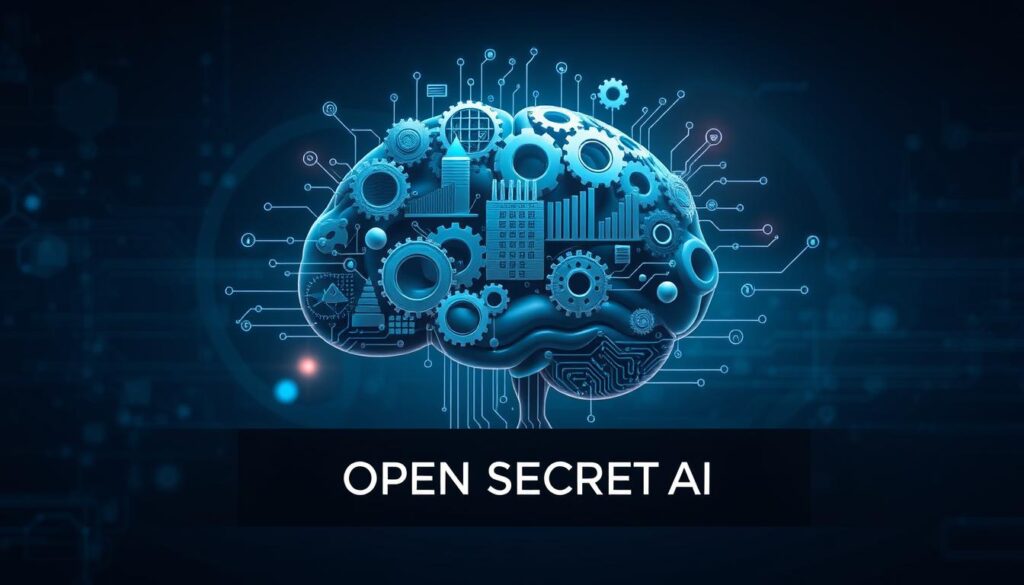
Working with custom GPTs is an ongoing effort. It needs constant improvement based on real-world use. These AI solutions, powered by deep learning and open-source tech, are changing industries. They bring new ideas and make operations more efficient.
Custom GPT: Transforming Business Operations
Custom GPT models are changing how businesses work. They are made for specific needs, making things more efficient and helping with decisions. This leads to better workflow automation.
Enhancing Operational Efficiency
Custom GPT models are great at doing repetitive tasks. They can automate processes and make things more productive. For example, in customer service, they can answer common questions fast and accurately.
In content creation, they can write drafts and even whole articles. This makes creating content much faster and more efficient.
Improving Decision-Making Processes
These AI models can look at big datasets and give insights for better decisions. They help businesses plan strategically and make better choices. This is true for things like financial forecasting and market analysis.
Streamlining Workflow Automation
Custom GPT solutions can automate workflows, working well with other systems and APIs. They take over routine tasks, letting employees do more important work. This leads to more productivity and fewer mistakes.
As businesses use custom GPT technology, they see big improvements. They get better efficiency, smarter decision-making, and smoother workflows. This is opening up a new world of AI solutions for different industries.

Key Benefits of Implementing Custom Language Models
Custom language models, like those using natural language processing and artificial intelligence, can change how businesses work. These models, known as Custom GPTs, bring many benefits. They help organizations succeed in today’s fast-paced world.
Custom GPTs make user experiences more personal. They remember what users like and how they interact. This leads to better conversations and stronger relationships with customers and clients.
These models also automate routine tasks. This lets employees spend more time on creative problem-solving. It makes work more efficient and saves costs.
In marketing and content creation, Custom GPTs are a big deal. They can come up with ideas for slogans and social media posts. This boosts creativity and helps businesses make engaging content faster.
The use of Custom GPTs is a big chance for businesses to stand out. By using conversational AI and custom models, companies can offer better customer experiences. They can also make their operations more efficient and create new content ideas.
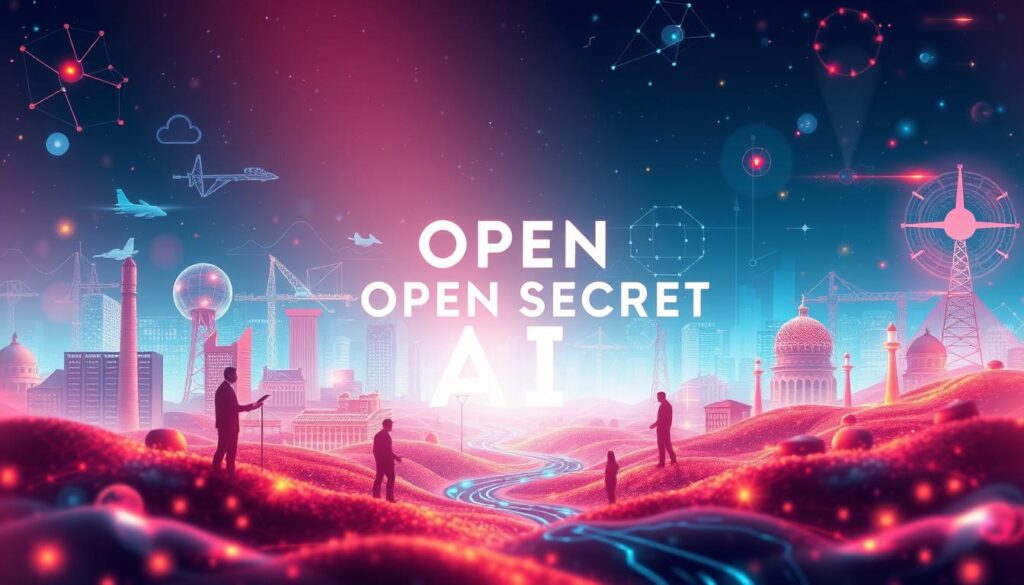
Applications Across Different Industries
Custom GPT models are used in many industries. They help in healthcare, finance, and law. These models change how businesses work and solve problems.
Healthcare and Medical Diagnostics
In healthcare, custom GPTs are making a big difference. Ada Health uses a GPT chatbot for medical advice and symptom checks. This helps patients get quick and accurate help, leading to better health care.
Financial Services and Banking
Custom GPTs are changing finance too. JPMorgan Chase uses them to analyze financial reports and market data. This helps them make better investment choices and predict the market.
Legal and Compliance Sectors
Law and compliance also benefit from custom GPTs. LawGeex uses GPT to review and approve contracts. It understands legal documents well, making the process faster and more accurate.
These examples show how custom GPTs can change industries. As more businesses use them, we’ll see even more improvements in efficiency and decision-making.
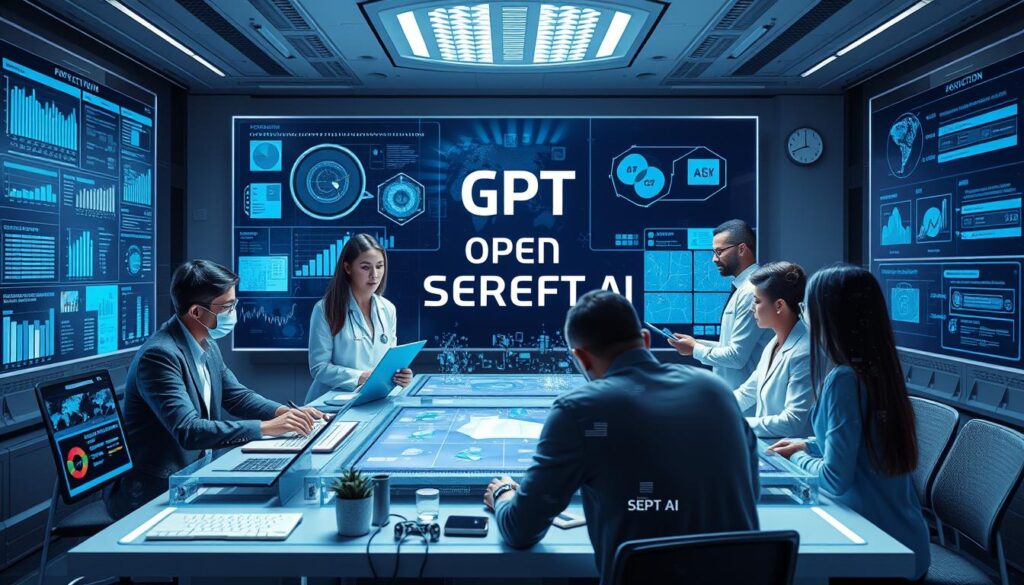
Building Effective Custom GPT Solutions
In the fast-changing world of artificial intelligence, custom GPT models are changing the game for businesses. These models are making a big difference in how companies solve problems, automate processes, and talk to customers.
To make a good custom GPT solution, you need a clear plan. First, figure out what your business needs and what you want to achieve. This could be faster responses, happier customers, or better content creation. Knowing what you want helps guide the development process.
Choosing the right partner for your custom GPT project is key. Look for companies with lots of experience in making these models. Check their past work and what others say about them. Also, make sure they know about the latest transformer models, open-source AI, and machine learning technologies.
Getting the right data is very important for your custom GPT model. The data should match your industry or domain. This helps the AI give accurate and relevant answers. Make sure the data is well-prepared and checked to ensure the model works well.
- Identify specific business needs and set clear, measurable goals.
- Select a development partner with proven expertise in custom GPT applications.
- Collect and curate high-quality, diverse data to train the custom GPT model.
- Continuously monitor and optimize the model’s performance to ensure it meets the evolving business requirements.
“Custom GPTs are revolutionizing the way businesses approach problem-solving, automation, and customer engagement. By leveraging specialized language models, organizations can unlock unprecedented efficiency and personalization.”
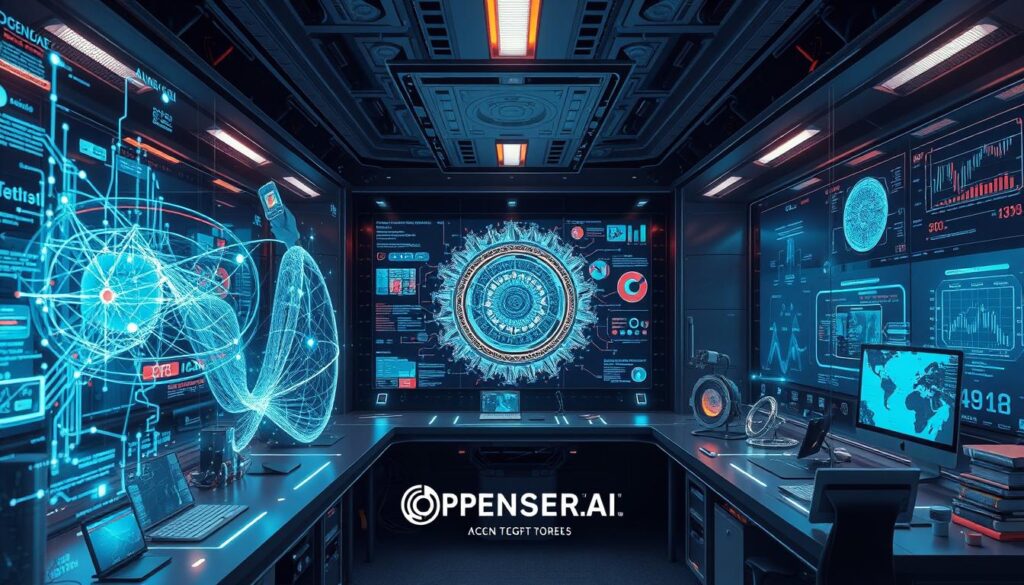
Creating effective custom GPT solutions needs a smart and team effort. But the rewards can be huge for businesses. These models can help companies work better, make smarter choices, and give customers a better experience.
Data Quality and Training Considerations
Creating effective custom GPT solutions needs careful focus on data quality and training. A good custom GPT model starts with high-quality, organized data. This data should match the specific needs of the project. It should include a wide range of examples, from industry terms to common documents and questions.
Data Collection Best Practices
The quality of training data is key for custom GPT models. Companies should follow best practices in data collection. This includes:
- Gathering data from reliable and diverse sources
- Implementing rigorous data cleaning and preprocessing techniques
- Ensuring data is representative of the target audience and use case
- Continuously expanding and updating the dataset to capture evolving industry trends and requirements
Model Training and Fine-tuning Strategies
Training and fine-tuning custom GPT models is an ongoing process. It involves adjusting settings, trying different approaches, and checking the model’s output. Techniques like transfer learning, human feedback, and data augmentation help improve the model. They make sure it gives accurate and relevant answers.
Performance Monitoring and Optimization
Keeping custom GPT models effective is a continuous task. It’s important to regularly check how well the model works in real situations. Companies need strong strategies for monitoring and improving performance. This helps find and fix problems and keeps the model up to date with business needs.
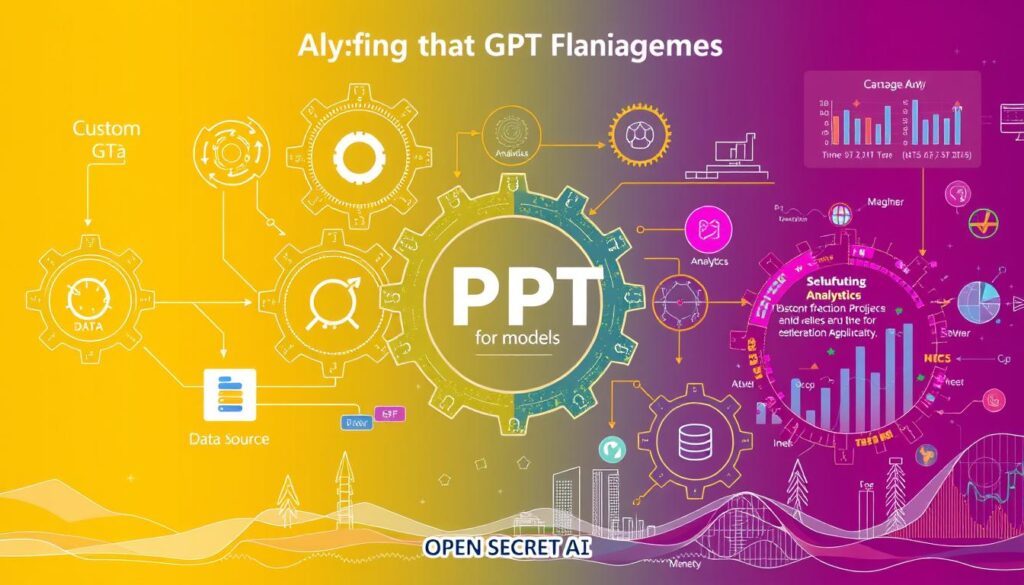
By focusing on data quality, using smart training methods, and always improving, companies can unlock the full power of custom GPT models. This can lead to new innovations and help achieve business goals.
Integration Challenges and Solutions
As more companies use AI chatbots and text generation with artificial intelligence, they face integration challenges. These include compatibility issues, data security, and making sure users have a smooth experience. Overcoming these hurdles is key for success.
Working together between development teams and stakeholders is essential. It’s important to make sure the custom GPT fits with current systems and workflows. Also, strong security measures like encryption and following data protection laws are vital.
Training employees and users well can also help. This way, everyone knows how to use the new technology. By tackling these challenges, companies can fully benefit from AI chatbots, text generation, and artificial intelligence. This leads to better operations and customer service.
| Integration Challenges | Proposed Solutions |
|---|---|
| Compatibility issues with existing systems | Careful planning and seamless integration with legacy infrastructure |
| Data security and compliance concerns | Implementing robust encryption methods and adhering to data protection regulations |
| Ensuring a smooth user experience | Providing extensive training and support for employees and end-users |
“Integrating custom GPT applications into existing systems requires a strategic, collaborative approach to overcome compatibility, security, and user experience challenges. By addressing these hurdles, organizations can unlock the transformative power of artificial intelligence technologies.”
Future Trends in Custom GPT Development
The world of language models is changing fast. We’re looking forward to exciting changes in custom GPT development. Expect more specialized models, better handling of different inputs, and clearer explanations.
More models will be made for specific areas, like healthcare or finance. The Large Language Model (LLM) market is growing fast, reaching $40.8 billion by 2029. This shows how much interest there is in AI for different needs.
Custom GPTs will work better with other AI, like seeing and hearing. This means they can do more things and help in many ways.
There’s a big push to make these models clear and easy to understand. This will help build trust and make sure we know how they work.
“As the language model technology continues to evolve, we can expect to see a surge in the development of custom GPT solutions that are tailored to specific industries and applications, showing unparalleled capabilities and insights.”
The future of custom GPT looks bright. With new tech in language models, conversational AI, and open-source AI, we’re in for a big change. It will change how businesses use AI.
Privacy and Security Considerations
Custom GPT models are changing how industries work. They use artificial intelligence and deep learning to improve business operations. But, they also raise big privacy and security concerns.
Companies must protect sensitive data and follow ethical guidelines. This is key to using these powerful tools responsibly.
Data Protection Measures
Keeping data safe is essential with custom GPT. This means encrypting data and controlling who can access it. Regular security checks are also important to find and fix problems.
It’s important to keep the data used to train models safe and private. This ensures the data’s integrity and confidentiality.
Compliance Requirements
Following laws like GDPR and HIPAA is critical. Businesses need to know the rules for their industry. They must take steps to meet these standards.
Not following these laws can lead to big legal and financial problems. It’s a serious issue for companies.
Ethical Implementation Guidelines
Using custom GPT must be done ethically. Companies need to deal with issues like bias and transparency. They should also let users control their data and interactions with AI.
This ensures users’ privacy and trust. As more companies use these AI tools, being ethical and responsible will set them apart.
Conclusion
Custom GPT models have changed the game in many industries. They offer AI solutions that make things more efficient, creative, and user-friendly. This is true for healthcare, finance, legal services, and content creation.
These models are making businesses better and helping them make smarter choices. They open up new ways for companies to succeed in a tough market.
The tech keeps getting better, but we need to tackle issues like data quality and privacy. The future of custom GPTs looks bright, with lots of room for growth and new ideas.
These models show how far AI and natural language processing have come. They’re leading the way to a future where humans and AI work together to achieve great things.
More and more companies are using custom GPT models. This shows how powerful they are. The lessons we learn from them will help create even better AI solutions in the future.
As we keep using these models, we’ll see even more efficiency, creativity, and engagement. This will shape the future of many industries and how we use technology.
FAQ
What are custom GPT models?
Custom GPT models are special versions of OpenAI’s GPT architecture. They are made for specific areas and industries. These models open up new possibilities for innovation and automation in many fields.
How do custom GPT applications differ from general GPT models?
Custom GPT applications are made by training AI models with GPT technology for specific needs. They give more accurate answers than general GPT models.
What are the key benefits of implementing custom GPT applications?
Using custom GPT applications brings many benefits. These include personalized experiences, better efficiency, and more creativity and innovation.
How are custom GPT models being used across different industries?
Custom GPT applications are used in many industries like healthcare, finance, and law. They make operations more efficient, help in making better decisions, and automate workflows.
What are the considerations for building effective custom GPT solutions?
To build good custom GPT solutions, you need a clear plan. This includes knowing your business needs, setting goals, choosing the right company, and getting the right data.
What are the data quality and training considerations for custom GPT models?
Good data and training are key for custom GPT models. Make sure your data is clean and complete. Also, keep training and fine-tuning your model.
What are the key integration challenges and solutions for custom GPT applications?
Integrating custom GPT apps into existing systems can be tough. You might face issues like compatibility, security, and user experience. To solve these, plan carefully and work together with your team and stakeholders.
What are the future trends in custom GPT development?
The future of custom GPT development looks exciting. We can expect more specialized models, better multimodal capabilities, and clearer explanations. There will also be a big focus on keeping data private and secure.


